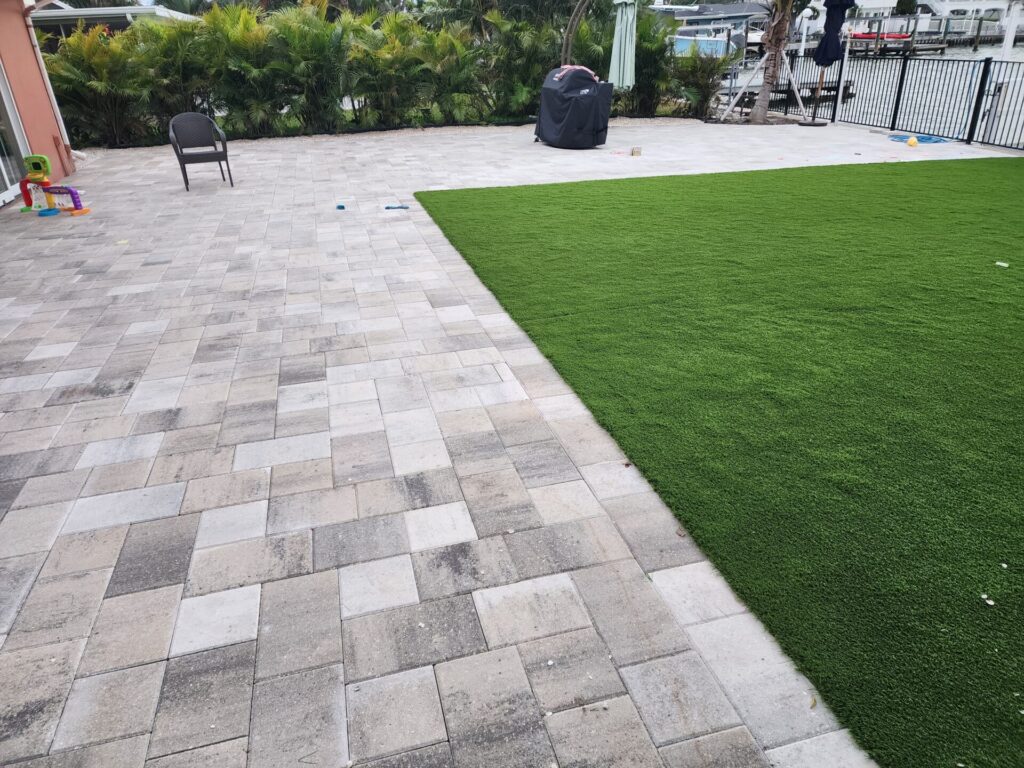When it comes to transforming your home’s outdoor spaces, paver installation is a top choice for homeowners seeking durability, beauty, and functionality. Pavers are versatile and can be used for driveways, patios, walkways, and pool decks, providing both aesthetic and practical benefits. If you’re considering paver installation for your home, here’s everything you should know before you get started.
1. Choosing the Right Type of Paver
Pavers come in a variety of materials, each with its unique properties and aesthetic appeal. Some of the most popular types of pavers include:
- Concrete Pavers: These are affordable, durable, and available in a wide range of colors and shapes. They offer versatility in design and are often used for modern, clean-lined projects.
- Brick Pavers: Classic and timeless, brick pavers offer a warm, traditional look. They are durable and easy to maintain, making them ideal for driveways and walkways.
- Natural Stone Pavers: Known for their natural beauty and elegance, stone pavers like flagstone, travertine, or granite can elevate the look of any outdoor space. While more expensive, their durability and unique appearance make them a great investment.
- Permeable Pavers: These eco-friendly pavers allow water to pass through, helping with drainage and reducing runoff. They’re perfect for areas prone to heavy rainfall or if you’re looking to reduce your environmental impact.
The type of paver you choose will depend on your design goals, budget, and the specific needs of your outdoor space.
2. The Importance of a Solid Base
A proper paver installation begins with a well-prepared base. The success and longevity of your paver project depend on the foundation. This involves excavating the area, compacting the soil, and laying a base material like gravel or crushed stone to ensure proper drainage and support.
Without a solid base, pavers can shift, sink, or crack over time, leading to uneven surfaces or water pooling. A professional installer will ensure that the base is adequately prepared to handle both the weight of the pavers and any vehicles or foot traffic that the area will see.
3. Design Flexibility
One of the biggest advantages of pavers is the endless design possibilities they offer. Whether you’re creating a simple patio or a more intricate driveway, pavers allow for a variety of patterns and layouts, including:
- Herringbone Pattern: This zig-zag design is one of the most popular, offering strength and a visually appealing look.
- Basketweave Pattern: This creates a classic, woven appearance using two pavers laid horizontally and two vertically.
- Running Bond: This simple, linear pattern is great for walkways and driveways, creating a streamlined look.
You can also mix and match paver colors and textures to create borders, accents, or unique focal points in your outdoor space. The versatility of pavers makes them ideal for creating customized looks that reflect your personal style.
4. Maintenance and Longevity
One of the key reasons homeowners choose pavers is their low maintenance. However, while they’re durable, there are a few steps you can take to keep your pavers looking their best for years to come:
- Regular Cleaning: Sweep your pavers regularly to prevent dirt and debris buildup. You can also use a garden hose or pressure washer for a deeper clean.
- Weed Prevention: Weeds can sometimes grow between paver joints, but applying polymeric sand during installation can help prevent this. It hardens when wet and locks the pavers, reducing weed growth.
- Sealants: Consider sealing your pavers every few years to protect them from stains, weather damage, and fading. This is especially important if your pavers are exposed to heavy traffic or direct sunlight.
By maintaining your pavers, you’ll ensure they retain their color, integrity, and beauty over time, making them a cost-effective, long-lasting solution for outdoor areas.
5. Weather and Drainage Considerations
Tampa’s frequent rain and occasional hurricanes can impact your outdoor space. The good news is that pavers, when installed correctly, offer excellent drainage solutions. The joints between pavers allow water to flow naturally into the ground, reducing the risk of standing water and flooding.
If you live in an area prone to heavy rain, you might also consider permeable pavers. These are designed specifically to allow water to seep through, helping to manage runoff and prevent erosion. Proper drainage planning is key to ensuring that your paver installation lasts and performs well over time.
6. Cost and Value
The cost of a paver installation project can vary depending on factors like the size of the area, the type of pavers used, and the complexity of the design. While pavers may have a higher upfront cost than materials like poured concrete, they offer long-term value in terms of durability and aesthetic appeal.
Paver installations can also increase your home’s property value. A well-designed driveway, patio, or walkway adds curb appeal and creates functional outdoor living spaces, making your home more attractive to potential buyers if you ever decide to sell.
7. Professional Installation vs. DIY
While it’s tempting to consider a DIY paver installation to save money, this type of project requires skill, precision, and proper tools. Incorrect installation can lead to drainage issues, shifting pavers, and uneven surfaces, which can end up costing more to fix in the long run.
Hiring a professional ensures that your paver project is installed correctly from the start. Professionals will handle everything from excavation and base preparation to laying the pavers and securing the edges. The investment in a professional installer guarantees that your pavers will be durable, properly aligned, and aesthetically pleasing.
Conclusion
Paver installation is an excellent way to enhance the look, function, and value of your home’s outdoor areas. With their durability, design flexibility, and low maintenance, pavers offer a long-lasting solution that can transform your driveway, patio, or walkway into a beautiful and functional space. By choosing the right type of paver, ensuring proper installation, and maintaining your investment, you can enjoy the benefits of pavers for many years to come.
